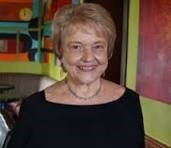In Memoriam: Donna Ruebush Copeland
In Memoriam:
Donna Ruebush Copeland, Ph.D.
Innovative and Dedicated Leader in Psycho-Oncology for Children and Adolescents
January 15, 1939 – July 28, 2022

Dr. Donna Copeland of The University of Texas MD Anderson Cancer Center, Department of Pediatrics, was a pioneer of Pediatric Psycho-Oncology. She graduated cum laude from Rice University in 1975 and completed her Ph.D. in Psychology from the University of Houston in 1979. Dr. Copeland was an outstanding clinician, innovative researcher, and inspiring mentor.
Dr. Copeland created the Behavioral Medicine Program at the University of Texas MD Anderson Cancer Center in 1979 and provided continuous leadership for the program until her retirement in 2003. During her tenure, the program grew to be comprised of professionals from Psychology, Neuropsychology, Education/Hospital School, Child Life, and Creative Arts. The Behavioral Medicine Program remains a highly valued model for interdisciplinary psychosocial care in pediatric settings.
Dr. Copeland and Dr. Archie Bleyer launched the Adolescent and Young Adult (AYA) Program at MD Anderson in 1996, focusing on the unique medical and developmental/psychosocial needs of these patients, previously overlooked.
Dr. Copeland embraced the concept of helping children, adolescents, and young adults live life fully and as normally as possible throughout treatment and into survivorship. This challenged the status quo which had primarily focused on the medical treatment of children who traditionally “re-entered” active life once treatment finished. Dr. Copeland created an in-hospital school and developed psychosocial programming that engaged pediatric patients in developmentally meaningful expressive activities. This initiative was very important, for children to remain as active as possible during cancer treatment lessens its potentially traumatic effects and promotes self-esteem as well as a positive quality of life into survivorship.
Dr. Copeland’s 58 publications in psycho-oncology and neuropsychology have had an estimated 3,273 citations, demonstrating the importance of her landmark work. At MD Anderson, Dr. Copeland and colleagues conducted groundbreaking research in the neurocognitive late effects of cranial radiation and intrathecal methotrexate in children treated for leukemia and brain tumors. These seminal studies provided the basis for the development of clinical treatment trials without radiation for young patients, thereby promoting a healthier balance of treatment toxicity with efficacy. In addition, these studies supported the need for research in cognitive remediation for childhood cancer survivors with cognitive deficits or weaknesses.
Dr. Copeland participated in the Pediatric Adaptation to Childhood Cancer Consortium with colleagues such as Drs. O.J. Sahler, Sean Phipps, Raymond Mulhern, and Robert Noll, among others. The consortium first brought attention to sibling adaptation to childhood cancer in 1996. Next, the group focused on problem-solving interventions for parents and caregivers of children with cancer based on the tenet that positive parental coping would support children’s psychological adaptation to the challenges of cancer. The series of problem-solving skills training studies demonstrated that problem-solving knowledge and skills increase with coaching and are associated with greater positive affectivity in the parents. The problem-solving interventions were found to be especially helpful to Spanish-speaking parents.
Dr. Copeland provided outstanding training to future pediatric clinical psychologists. She promoted their professional growth through meaningful supervision of clinical interventions and review of written notes and reports. She was a brilliant writer and editor who imparted sage and candid wisdom through her dedicated supervision style. Dr. Copeland’s clinical approach was based in psychodynamic theory; therefore, she maintained that the therapeutic relationship itself was very instrumental in the patient and family’s growth and healing throughout their cancer journey.
Personally, Dr. Copeland was passionate, thoughtful, and dedicated. She remained very active in retirement as a member of the Houston Candlelighters board and the Houston Film Critics Society. Her movie reviews were enlightening, informed by her knowledge of psychoanalysis and human development. Not surprisingly, her insights were especially valued for movies whose audience included children, because of her expertise in child psychology. Dr. Copeland was a very caring friend to many who likewise treasured her friendship.
Dr. Copeland’s professional contributions and dedication to family-centered, interdisciplinary care were essential in advancing childhood cancer treatment and quality of life for children, AYAs and their families as the hope for greater survival rates became a reality during her tenure. Dr. Copeland is missed immensely, but her life and career will continue to inspire us as we build on the important foundations she established in excellent childhood and AYA cancer care.
Publications
ResearchGate: https://www.researchgate.net/scientific-contributions/Donna-R-Copeland-4568630
Google Scholar: https://scholar.google.com/scholar?hl=en&as_sdt=0%2C3&q=Donna+R.+Copeland&oq=
Martha A. Askins, Ph.D.
MD Anderson Cancer Center, Houston, TX
